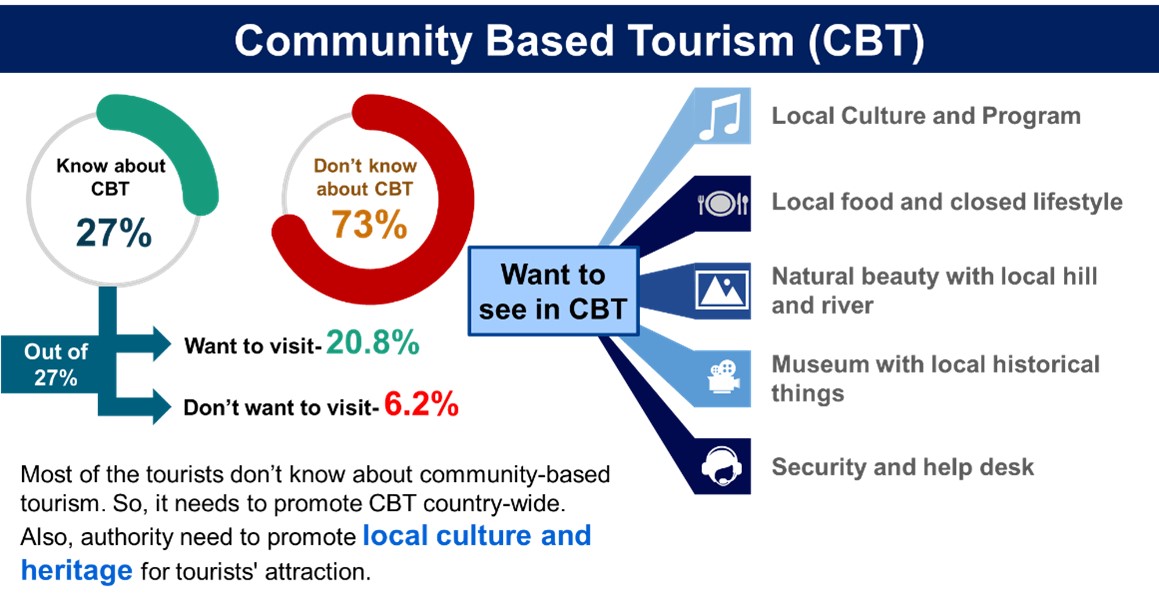Leveraging Data and Partnerships to Drive Tourism Sector Development in Bangladesh
Mapping Tourists’ Mind to introduce and nurture Data Driven Decision-making culture in the tourism sector for creating Informal Employment opportunities
June 30, 2023

Photo 1: Saint Martin’s Island- one of the most attractive tourist destinations in Bangladesh
By Dr. Ramiz Uddin, Head of Experimentation, UNDP Bangladesh Accelerator Lab Muntashir Al Arefin, Data Innovation and Result Management Officer, UNDP AccLab Samiha Akter Sima, Experimentation and Innovation Associate, UNDP AccLab Ali Arman, Data Innovation Assistant, UNDP AccLab
In Bangladesh, tourism sector contributes slightly greater than 3% in the national GDP, whereas Maldives one-third of the national GDP is contributed by the tourism sector. Studies shows that with its natural beauty, ancient relics and indomitable hospitality, Bangladesh possesses the potential to be an amazing tourist destination in South Asia. In Bangladesh Tourism can serve as a great tool to diversify not only the foreign currency earning capacity of the country – but also the productive capacity of the economy of Bangladesh.
Why mapping tourist mind in Bangladesh?
In Bangladesh, no data available on community-based tourism (CBT), security arrangement, tourist policing, and the tourists’ expectation. The need for these data became evident when the Bangladesh Tourism Board (BTB) was working for developing a 25-year long Tourism Master Plan for Bangladesh. They reached out to the UNDP Accelerator Lab to determine the time convenient process for understanding the needs of tourists and develop policy based on data insights. Therefore, UNDP Accelerator Lab sensed the need for evidence-based policymaking to help the policy makers in designing interventions for development of sustainable and responsible tourism and designed a survey for mapping tourists’ mind and generate data analytics based on tourists’ demand.

Figure 1: Why mapping tourists’ mind
Procedure

Figure 2: Steps of mapping tourists’ mind by Accelerator Lab Bangladesh
The survey was conducted in two phases. In the first phase, Bangladesh Tourism Board (BTB), along with UNDP and tourism service providers incorporated back-to-back discussion and stakeholders’ consultation to identify the gaps and reaffirmed the areas where they should provide attention to develop the tourism industry in Bangladesh.
In line with that, high officials from the Ministry of Civil Aviation and Tourism with UNDP officials and BTB visited different tourist spots to explore the different components including products and services of tourism in those locations. During the field visit, they listed a few interventions to attract more tourists. But suggestions came to the point, do the tourists really expect or need these services? This phase of the research involved several workshops, seminars, situation analysis, physical and online meetings, focused group discussions (FGD), one to one interview, key informant interview (KII), expert interview, case studies etc.

Photo 2: Government’s High Official placing his overview on tourism in a field visit.
Here, Accelerator Lab started the second phase. Following the concerns of the stakeholders and experts, a survey questionnaire for Mapping Tourist Mind was designed to know tourist expectations, tourists’ interests, tourist attraction, tourist satisfaction and dissatisfaction regarding the tourism services, security, and other concerns.
A number of tourism experts, tourist service providers, and tourism organizations were engaged during the development of the survey tools. They continuously provided their feedback on what questions should be added or what should be removed from the questionnaire and tools. The study team also studied 6 sample questionnaires and methodology on mapping tourist mind survey of different countries to make the questionnaire comprehensive. The team received feedback from the Tourist police, Tour Operator Owners Association of Cox's Bazar (TOAC), Bangladesh Tourism Board and incorporated those into the questionnaire. After a series of back-to-back reviews, revision and alters in the questions the team proceed for the field test. Prior to the survey, the entire questionnaire was split into 3 thematic parts and went to the random respondents with a different set of questionnaires to make it time convenient for the tourists.

Picture 3: Data collection from Cox’s Bazar- the longest unbroken sea beach of the world.
Mapping Tourist Mind Survey findings:
The reveals data analysis shows that most of the tourists planned their tour on their own (89%), and a small portion (12%) of the tourists participated in the interview went through tour operator services. Data also shows that less than half of the tourists (40%) were satisfied and very little portion (8%) of the tourists were dissatisfied with the services they received. Compensating on that, they expected more safe and friendly environment and better room services along with online review system. In terms of food, half of the participants were satisfied with the food services and the overall food management.
Nevertheless, one third (32%) of the participants complained that the cost is too high considering the quality and quantity of food and feel that solo travelling is not safe in nighttime. Almost three-fourths (79%) of the tourists were satisfied with the overall security arrangement made by the security agencies. Most of the tourists (86%) who participated in the survey think they are also contributing to keeping the beach clean and dump the waste in designated spots. The findings received from the study show where the interventions shall be prioritized and what new interventions shall be introduced to keep the tourists engaged in the tourist place for minimum duration.

Figure 3: Tour Types and Duration of Stay

Figure 4: Satisfaction of Tourists on Security

Figure 5: Tourists’ thoughts on Community Based Tourism
What’s Next
Approximately 5 million people are directly or indirectly engaged in the tourism sector of Bangladesh and additional 2 million workforce will be added in this sector gradually within 2030. The UNDP Bangladesh Accelerator Lab is continuously pursuing strategies to lower unemployment rate in the country.

Figure 6: What’s next (Recommendations)
This callout emphasizes the importance of leveraging data-driven decision-making to unlock the untapped potential of the tourism sector in Bangladesh. By empowering decision-makers with comprehensive insights and analysis, we can drive the growth and development of tourism, paving the way for a vibrant and prosperous industry.

 Locations
Locations


